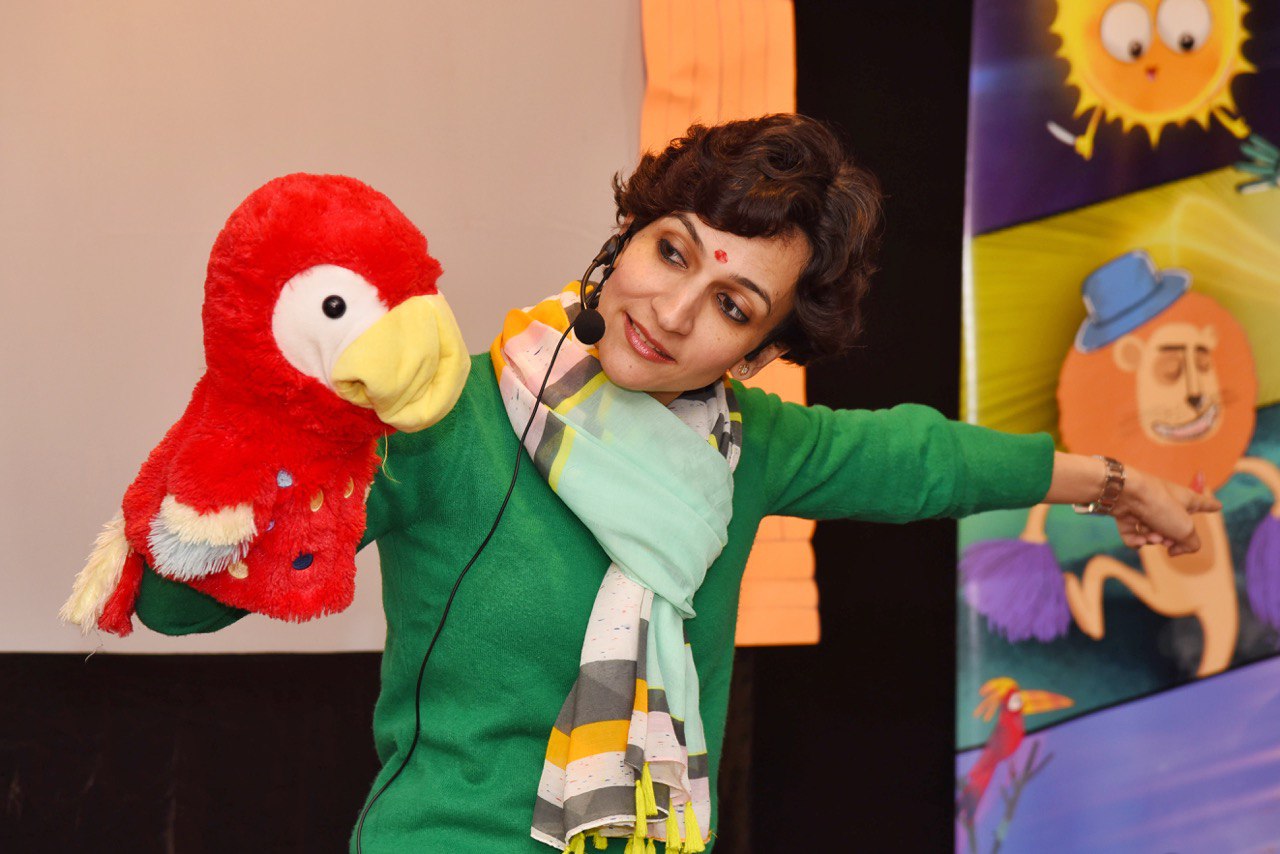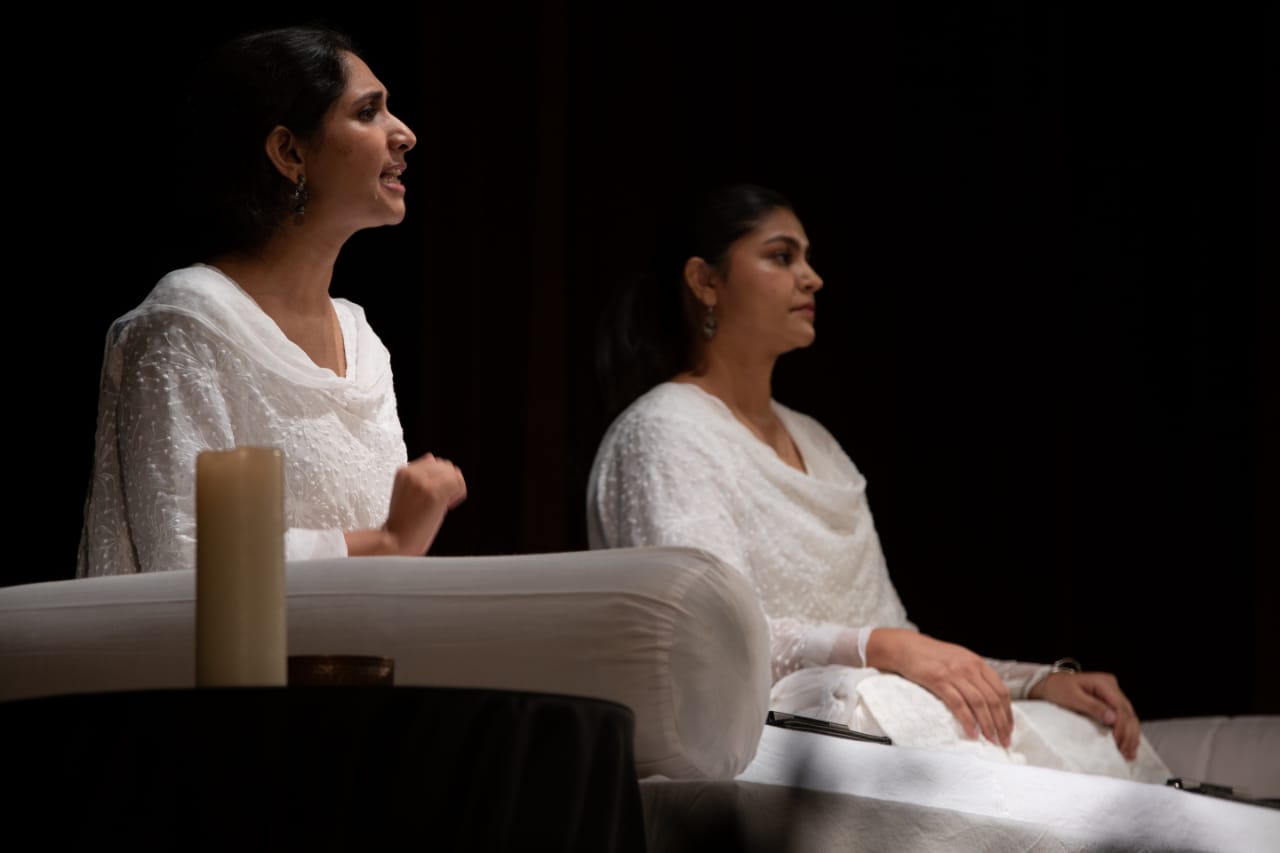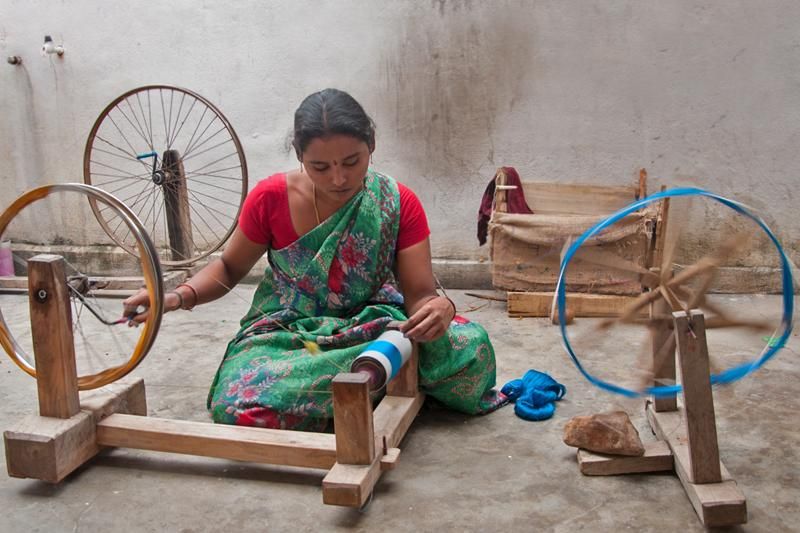Dr. Shweta Of Droomplanet Believes That Storytelling Can Save Humanity In Our Children
- IWB Post
- March 30, 2021

‘Once upon a time,’ a phrase that can instantly touch a chord, strike a conversation and bring a big smile on a child’s face. But the way a story is told also matters as much as the story itself. The story unfolds as a drama, a real-life experience only when the story-teller breathes expressions and forms into it.
So who then is a storyteller? Well, in a larger literary view, as Jimmy Neil Smith might say, “We are all storytellers. We live in a network of stories. There isn’t a stronger connection between people than storytelling.” The storyteller is the one who becomes the child to whom the story is being narrated. Who sheds inhibitions and illicit a reaction to the story by their own actions and expressions. A storyteller is hence a friend, a character within the story, an extension of the child’s very imaginative ‘tale’ored world.
In a world that is driven by gadgets and machines, storytellers perhaps are the biggest saving grace of innocence and child-like magic. One such magician is Dr. Shweta, an author, storyteller, trainer, parenting coach, Director at Tickling Tales, and co-founder of Droomplanet. A dentist by profession, she realized the power of stories when her own son was born. As she says, “I think storytelling was a calling, it was something that I could contribute a bit more to the society.”
For someone who wasn’t much of a reader herself in her younger days, Dr. Sweta’s journey from dreading a trip to the library with her mother to finally founding Tickling Tales and heading a team of wonderfully talented storytellers is quite a little story in itself. “I realized with time that reading was essential and I used to see kids everywhere surrounded and playing video games and not reading books, I used to feel where this generation is heading? If I didn’t do it, if I didn’t read as a child, then this generation is not doing it all together. And so I used to tell myself that when I have my child I would get him more into stories. That’s when I picked up books for myself and I told a lot of stories to him from the beginning. Seeing the impact and result of stories on him made me realize how convenient the journey of parenting had become for me. And that’s when I realized that the entire concept of storytelling and raising readers should go beyond my four walls and I should help more and more kids to evolve and fall in love with books. In fact, everybody in the house should have a mini library so that kids and adults feel that they belong to that place.”
Tickling Tales began in 2013 and there has been no looking back. A group of storytellers, Tickling Tales’ vision is to ‘raise readers, get children back to books and make them fall in love with reading.’ Besides storytelling sessions, the team also has parenting sessions, training programs with teachers, as well as school sessions. Dr. Shweta is also the co-founder of Droomplanet, an app that can be easily installed on your gadget and has a repository of lovely audio stories for the little ones to soak in. We caught up with Dr. Shweta to learn a little more about children, tales, and how stories can bring about real change.
Why and how are stories important for children?
Dr. Shweta: Stories are the birthright of every child. You give food to a child for a healthy body, but for a healthy life, you need a healthy mind, as well. So every child needs to have that kind of imagination, that thought process. You can’t just tell them that this is a fact and this will stay this way, because unless they imagine beyond those facts which exist how will we raise children who are the creators of tomorrow? So I think stories are a necessity. Stories have to become an integral part of every childhood.
There are various kinds of stories. What kind of stories should ideally be told to kids, those that have a moral, those that kindle their imagination, or those through which they understand concepts like planets, money, etc.?
Dr. Shweta: I think everything. Why not tell them things that don’t happen in reality. A lot of parents ask me if fairy tales are good for children since there are so many unnatural things going on in them. And I say go back and listen to Albert Einstein where he says, “If you want to raise a genius, tell him fairy tales.” Also, it’s not that if you tell children about things that do not exist they start living in a fool’s world. No, they have their own better judgment; they know what is good and what is not good. Don’t underestimate them when it comes to telling stories, just tell them everything.
What role can stories play to help children understand concepts of gender equality and inclusivity? What are the new characters that one can introduce to break the notions of damsels in distress and the Princes Charmings?
Dr. Shweta: This is probably one aspect that exists in society and we need to act upon it. But I say when you raise a child who is smart enough and who has an overall awareness you will not have to guide him at individual topics and individual levels after that. They will just be so sorted about everything in life and they will always think beyond the little things in life. For example, my son is ten-years-old and he is an avid reader, and when I talk to him about religion, God, and everything he says that nature is his first religion. It is not that I have taught him this but he thinks and understands his responsibility in the larger world. So this is the kind of thought process we need to imbibe in children where they themselves are beyond all the little things in life.
What suggestions would you like to give parents to steer and interest their children in reading, especially in our digitally-driven world today?
Dr. Shweta: Just by bringing in books to the child will not raise another reader. You cannot say to the child that today I bought books worth Rs.2000 and now you have to read because I invested so much. This is like saying that tomorrow you buy a very fancy car for your child who doesn’t know how to drive and yet you tell your child to drive because you have invested in it. So as parents it is our duty to hold hands at that time, to excite them about the book, to take them through the journey of that book, and leave them in that state of curiosity about what happens next. And then they will probably read ahead. But from the first page, if you expect your child to read the book and like it, that will not happen. You have to create that spark in the child initially. Some parents are very cautious and begin this process from an early age of four-five years, and some start late. But no matter when you begin, as a parent you again have to build up the whole scenario of reading for the child, excite the child, and then gradually the child will go onto an autopilot mode.
Your thoughts on audiobooks? Can they substitute reading?
Dr. Shweta: Audio stories are equally important because they enhance children’s listening skills which are very important, especially with the current generation. So giving them meaningful content to listen to can develop their attention span. But at the same time giving an audio or a visual is a kind of passive way where the child is going at the storyteller’s speed and they have to digest it at that speed. When it comes to reading you are digesting at your own speed. So you kind of meditate when you get into a book. They read a page and then they start dreaming about something and then they read the next page and they dream a little more.
Puppets are one medium of storytelling. What other mediums can be incorporated to tell stories effectively?
For parents telling or reading stories to children at home, I think the biggest medium is to break your own inhibitions and be your child’s favorite storyteller. In the end, the parent is the child’s first storyteller, but as parents, we sometimes tie ourselves into so many chains by thinking this is not for me or I can’t be so animate. We as storytellers or teachers or parents of this generation are competing with the cartoon networks. When we were growing up we had grandmoms who would simply tell us stories and we would keep listening, but now we have a cartoon network! And so we have to be over-expressive, over-animated. We have to engage them further and so we need to open up a lot more and that will help kids connect with us a lot more, too. When you are trying to tell a story, just don’t feel that you are a parent or teacher, be a friend to the child. Rest everything comes later, whether it is a prop or puppet because storytelling is all about your body gestures and how you narrate it.
You are also associated with various NGOs. Can you tell us, maybe with a few examples, of how stories and sessions help children and also adults who are going through different difficulties or stress?
Dr. Shweta: Stories have tremendous healing. I primarily deal with children and I also call it story therapy. There have been endless incidents when mums have come to me saying that the child is hyperactive or the child needs to consult a psychologist at the age of four. We have spoken to the child, got the child into storytelling and we also guide the parent on how to do the bedtime story ritual to soothe down the child when the child is trying to sleep. All these things have tremendously helped children. To give an example, I am currently dealing with two children who were considered special children in school and one of them is in grade two. When he came to us, he was not reading at all. In six months’ time with us, he is reading beyond his peer group in the class. So sadly, I see so many children who have been labeled as special children for no reason. All they need is some warmth and good stories. Stories can transform them, all they need is to believe that the world is a beautiful place. I think stories are magical.
The team at Tickling Tales is an all-women team. Was this a conscious decision?
Dr. Shweta: After becoming moms, many women go through an identity crisis. They have to switch over their jobs, they have to find ways in which they can be more available to the children. I just feel that they need that help, hand-holding at that time where somebody can just help them and guide them and give them something which they can do from home. So that was the reason I wanted to reach out to moms.
What are your future plans in terms of taking the franchise forward?
Dr. Shweta: We want stories to be an integral part of every child on this planet and for that, we also have our app called Droomplanet. It is a story app and we are trying to get more and more young mothers on board who can take this concept ahead to whomsoever they know. We want more and more children listening to stories and going ahead on their reading journey with us. We want every child to fall in love with reading because for most parents the concern is that they want their child to be smart enough in academics but they don’t realize that the basic problem is in their reading. If the child is an avid reader, if the child can understand and comprehend, you really don’t have to bother much about the academics, etc. So we have to shift our focus a little as parents and educators and get more focused on understanding. We don’t have to raise rout learners. We see it as raising smarter kids who have good thinking abilities and stories can help do that.
Any parting advice for parents?
Dr. Shweta: To parents, I would say please do share a lot of stories with your child. They might be your childhood stories or from a book, but the more stories you share, the easier your parenting journey shall become. You will be a better friend with your child and you will raise a much more confident and smarter child. Because gone is the time that you knew what you had to teach your child for him/her to have a particular kind of job or career. No, it’s a very unpredictable world now. Also, in this gadget age, we are here to raise more humans and that’s what happens through stories.
- 0
- 0













